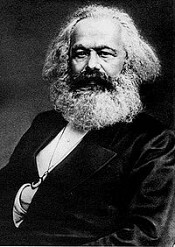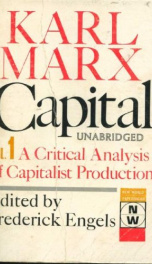Marx Karl

Karl Heinrich Marx (May 5, 1818 – March 14, 1883) was a German[1] philosopher, political economist, historian, political theorist, sociologist, communist and revolutionary, whose ideas are credited as the foundation of modern communism. Marx summarized his approach in the first line of chapter one of The Communist Manifesto, published in 1848: “The history of all hitherto existing society is the history of class struggles.” Marx argued that capitalism, like previous socioeconomic systems, will inevitably produce internal tensions which will lead to its destruction.[2] Just as capitalism replaced feudalism, he believed socialism will, in its turn, replace capitalism, and lead to a stateless, classless society called pure communism. This would emerge after a transitional period called the "dictatorship of the proletariat": a period sometimes referred to as the "workers state" or "workers' democracy" .[3][4] See, for example, Marx's comments in section one of The Communist Manifesto on feudalism, capitalism, and the role internal social contradictions play in the historical process: "We see then: the means of production and of exchange, on whose foundation the bourgeoisie built itself up, were generated in feudal society. At a certain stage in the development of these means of production and of exchange, the conditions under which feudal society produced and exchanged...the feudal relations of property became no longer compatible with the already developed productive forces; they became so many fetters. They had to be burst asunder; they were burst asunder. Into their place stepped free competition, accompanied by a social and political constitution adapted in it, and the economic and political sway of the bourgeois class. A similar movement is going on before our own eyes.... The productive forces at the disposal of society no longer tend to further the development of the conditions of bourgeois property; on the contrary, they have become too powerful for these conditions, by which they are fettered, and so soon as they overcome these fetters, they bring order into the whole of bourgeois society, endanger the existence of bourgeois property."[5] Marx argued for a systemic understanding of socio-economic change. He argued that the structural contradictions within capitalism necessitate its end, giving way to communism: On the other hand, Marx argued that socio-economic change occurred through organized revolutionary action. He argued that capitalism will end through the organized actions of an international working class: "Communism is for us not a state of affairs which is to be established, an ideal to which reality [will] have to adjust itself. We call communism the real movement which abolishes the present state of things. The conditions of this movement result from the premises now in existence." (from The German Ideology) While Marx remained a relatively obscure figure in his own lifetime, his ideas began to exert a major influence on workers' movements shortly after his death. This influence gained added impetus with the victory of the Marxist Bolsheviks in the Russian October Revolution in 1917, and few parts of the world remained significantly untouched by Marxian ideas in the course of the twentieth century. Karl Heinrich Marx was born in Trier, in the Kingdom of Prussia's Province of the Lower Rhine. His father, Heinrich Marx, a successful lawyer, was a man of the Enlightenment, devoted to Kant and Voltaire, who took part in agitations for a constitution in Prussia. His mother, born Henrietta Pressburg, was from Holland. Both parents were Jewish and were descended from a long line of rabbis, but, a year or so before Karl was born, his father—probably because his professional career required it—was baptized in the Evangelical Established Church. Karl was baptized when he was six years old.[6] Karl Marx married Jenny von Westphalen, the educated daughter of a Prussian baron, on June 19, 1843 in the Pauluskirche, at Bad Kreuznach. Marx and Jenny had seven children but due to poverty only three survived to adulthood.[7] Marx's major source of income was from the support of Friedrich Engels, who was drawing a steadily increasing income from the family business in Manchester. This was supplemented by weekly articles written as a foreign correspondent for the New York Daily Tribune.[8] Inheritances from one of Jenny's uncles and her mother who died in 1856 allowed the family to move to somewhat more salubrious lodgings at 9 Grafton Terrace, Kentish Town a new suburb on the then-outskirts of London. Marx generally lived a hand-to-mouth existence, forever at the limits of his resources, although this did to some extent depend upon his spending on relatively bourgeois luxuries, which he felt were necessities for his wife and children given their social status and the mores of the time. Marx had seven children by his wife: Jenny Caroline (m. Longuet; 1844–83); Jenny Laura (m. Lafargue; 1845–1911); Edgar (1847–1855); Henry Edward Guy ("Guido"; 1849–1850); Jenny Eveline Frances ("Franziska"; 1851–52); Jenny Julia Eleanor (1855–98) and one more who died before being named (July 1857). Marx also fathered an illegitimate son by his housekeeper, Helene Demuth.[9] Following the death of his wife Jenny in December 1881, Marx developed a catarrh that kept him in ill health for the last 15 months of his life. It eventually brought on the bronchitis and pleurisy that killed him in London on March 14, 1883. He died a stateless person[10][not in citation given]; family and friends in London buried his body in Highgate Cemetery, London, on March 17, 1883. Marx's tombstone bears the carved messages: “WORKERS OF ALL LANDS UNITE,” the final line of The Communist Manifesto, and Engels's version of the 11th Thesis on Feuerbach:[11] [12] The Communist Party of Great Britain had the monumental tombstone built in 1954 with a portrait bust by Laurence Bradshaw; Marx's original tomb had had only humble adornment.[13] In 1970 there was an unsuccessful attempt to destroy the monument using a homemade bomb.[14][15] Several of Marx's closest friends spoke at his funeral, including Wilhelm Liebknecht and Friedrich Engels. Engels's speech included the words In addition to Engels and Liebknecht, Marx's daughter Eleanor and Charles Longuet and Paul Lafargue, Marx's two French socialist sons-in-law, also attended his funeral. Liebknecht, a founder and leader of the German Social-Democratic Party, gave a speech in German, and Longuet, a prominent figure in the French working-class movement, made a short statement in French. Two telegrams from workers' parties in France and Spain were also read out. Together with Engels's speech, this constituted the entire programme of the funeral. Those attending the funeral included Friedrich Lessner, who had been sentenced to three years in prison at the Cologne communist trial of 1852; G. Lochner, who was described by Engels as "an old member of the Communist League" and Carl Schorlemmer, a professor of chemistry in Manchester, a member of the Royal Society, but also an old communist associate of Marx and Engels. Three others attended the funeral—Ray Lankester, Sir John Noe and Leonard Church. Cultural historians may regard Karl Marx as the first major social theorist to form a series of concepts within the break between modern and premodern societies.[16] Marx's parents had him educated at home until the age of thirteen. After graduating from the Trier Gymnasium, Marx enrolled in the University of Bonn in 1835 at the age of seventeen; he wished to study philosophy and literature, but his father insisted on law as a more practical field of study[17]. At Bonn he joined the Trier Tavern Club drinking society (Landsmannschaft der Treveraner) and at one point served as its president. Because of Marx's poor grades, his father forced him to transfer to the far more serious and academically oriented University of Berlin, where his legal studies became less significant than excursions into philosophy and history. During this period, Marx wrote many poems and essays concerning life, using the theological language acquired from his liberal, deistic father, such as "the Deity," but also absorbed the atheistic philosophy of the Young Hegelians who were prominent in Berlin at the time. Marx earned a doctorate in 1841 with a thesis titled The Difference Between the Democritean and Epicurean Philosophy of Nature, but he had to submit his dissertation to the University of Jena as he was warned that his reputation among the faculty as a Young Hegelian radical would lead to a poor reception in Berlin. Marx was influenced in his formative school years by Immanuel Kant and Voltaire. They were among his favorite authors, representing even early on his characteristic blend of German profundity and French subversive wit.[17] The Left or Young Hegelians consisted of a group of philosophers and journalists circling around Ludwig Feuerbach and Bruno Bauer, and opposing their teacher Hegel. Despite their criticism of Hegel's metaphysical assumptions, they made use of Hegel's dialectical method as a powerful weapon for the critique of established politics and religion. One of them, Max Stirner, turned critically against both Feuerbach and Bauer in his book "Der Einzige und sein Eigenthum" (1845, The Ego and Its Own), calling these atheists "pious people" for their reification of abstract concepts. Stirner's work made a deep impression on Marx, at that time a follower of Feuerbach: he abandoned Feuerbachian materialism and accomplished what recent authors have denoted as an "epistemological break." He developed the basic concept of historical materialism against Stirner in his book, "Die Deutsche Ideologie" (1846, The German Ideology), which he did not publish.[18] Another link to the Young Hegelians was Moses Hess, with whom Marx eventually disagreed, yet to whom he owed many of his insights into the relationship between state, society, and religion. During his years at college, the official lectures on Hegel left Marx feeling ill, "from intense vexation at having to make an idol of a view I detested." [17] Owing to the conditions of censorship in Prussia, Marx retired from the editorial board of the Rheinische Zeitung, and planned to publish, with Arnold Ruge, another revolutionary from Germany, the Deutsch-Französische Jahrbücher,[19] (the German-French Yearbook) based in Paris, and arrived in late October 1843. Paris at this time served as the home and headquarters of armies of German, British, Polish, and Italian revolutionaries. In Paris, on August 28, 1844, at the Café de la Régence on the Place du Palais he met Friedrich Engels, who would become his most important friend and life-long companion. Engels had met Marx only once before (and briefly) at the office of the Rheinische Zeitung in 1842;[20] he went to Paris to show Marx his recently published book, The Condition of the Working Class in England in 1844.[21] This book convinced Marx that the working class would be the agent and instrument of the final revolution in history.
do you like this author?
What readers are saying
What do you think? Write your own comment on this book!
write a commentWhat readers are saying
What do you think? Write your own comment on this author!
write a commentBook list

Το κεφάλαιον
Περίληψις Παύλου Λαφάργκ,μετά προλόγου Β. Παρέτο
Series:
Unknown
Year:
Unknown
Raiting:
3/5
Show more
add to favoritesadd In favorites

Revolution and Counter-Revolutionor,Germany in 1848
Series:
Unknown
Year:
Unknown
Raiting:
3.5/5
Show more
add to favoritesadd In favorites
Book list

Το κεφάλαιον
Περίληψις Παύλου Λαφάργκ,μετά προλόγου Β. Παρέτο
Series:
Unknown
Year:
Unknown
Raiting:
3/5
Show more
add to favoritesadd In favorites

Revolution and Counter-Revolutionor,Germany in 1848
Series:
Unknown
Year:
Unknown
Raiting:
3.5/5
Show more
add to favoritesadd In favorites

capital a critique of political economy volume 2
Series:
Unknown
Year:
Unknown
Raiting:
4.5/5
Show more
add to favoritesadd In favorites

capital a critique of political economy volume 1
Series:
Unknown
Year:
Unknown
Raiting:
1/5
Show more
add to favoritesadd In favorites

capital a critical analysis of capitalist production volume 2
Series:
Unknown
Year:
Unknown
Raiting:
3/5
Show more
add to favoritesadd In favorites

capital a critical analysis of capitalist production volume 1
Series:
Unknown
Year:
Unknown
Raiting:
4/5
Show more
add to favoritesadd In favorites

a contribution to the critique of political economy
Series:
Unknown
Year:
Unknown
Raiting:
5/5
Show more
add to favoritesadd In favorites

Selected Essays
Series:
Unknown
Year:
Unknown
Raiting:
4.5/5
The founder of Communism was Karl Heinrich Marx (1818 -1883). Marx was a German philosopher, political economist, historian, sociologist, humanist, political theorist and revolutionary. The Communist Manifesto (1848) was his most important work. Mark said, "Just as capitalism replaced feudalism, socialism will in its turn replace capitalism and lead to a stateless, classless society which will emerge after a transitional period, the 'dictatorship of the proletariat." Essays included in this work are A CRITICISM OF THE HEGELIAN PHILOSOPHY OF RIGHT, ON THE JEWISH QUESTION, ON THE KING OF PRUSSIA AND SOCIAL REFORM, MORALISING CRITICISM AND CRITICAL MORALITY: A POLEMIAGAINST KARL HEINZEN, PROUDHON, FRENCH MATERIALISM, and THE ENGLISH REVOLUTION.
Show more
add to favoritesadd In favorites
What readers are saying
What do you think? Write your own comment on this author!
write a commentif you like Marx Karl try:
readers also enjoyed
What readers are saying
What do you think? Write your own comment on this author!
write a commentGenre
if you like Marx Karl try:
readers also enjoyed
Do you want to exchange books? It’s EASY!
Get registered and find other users who want to give their favourite books to good hands!

